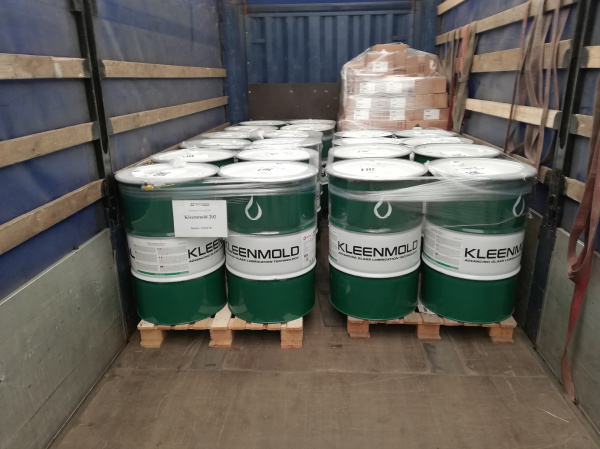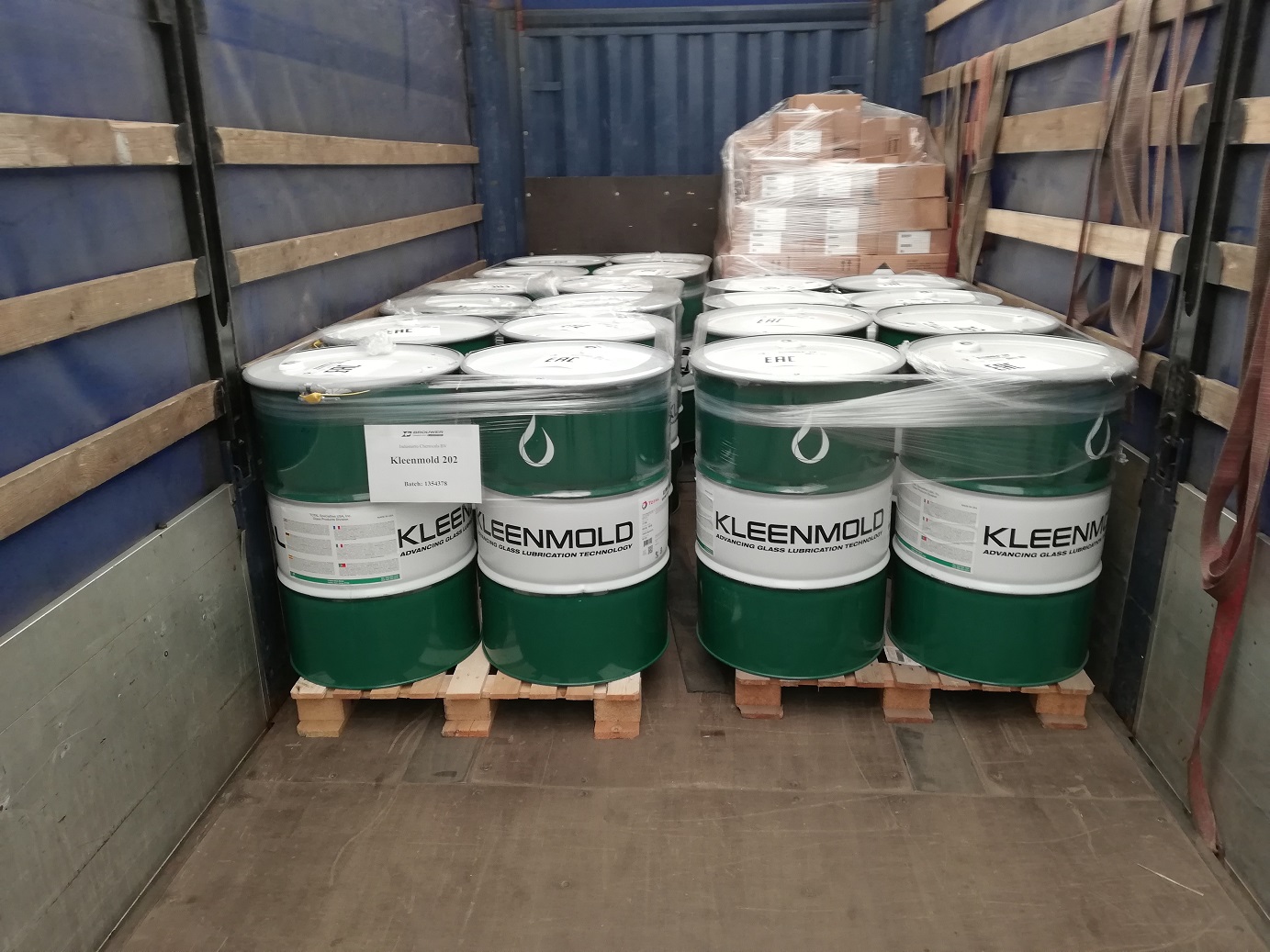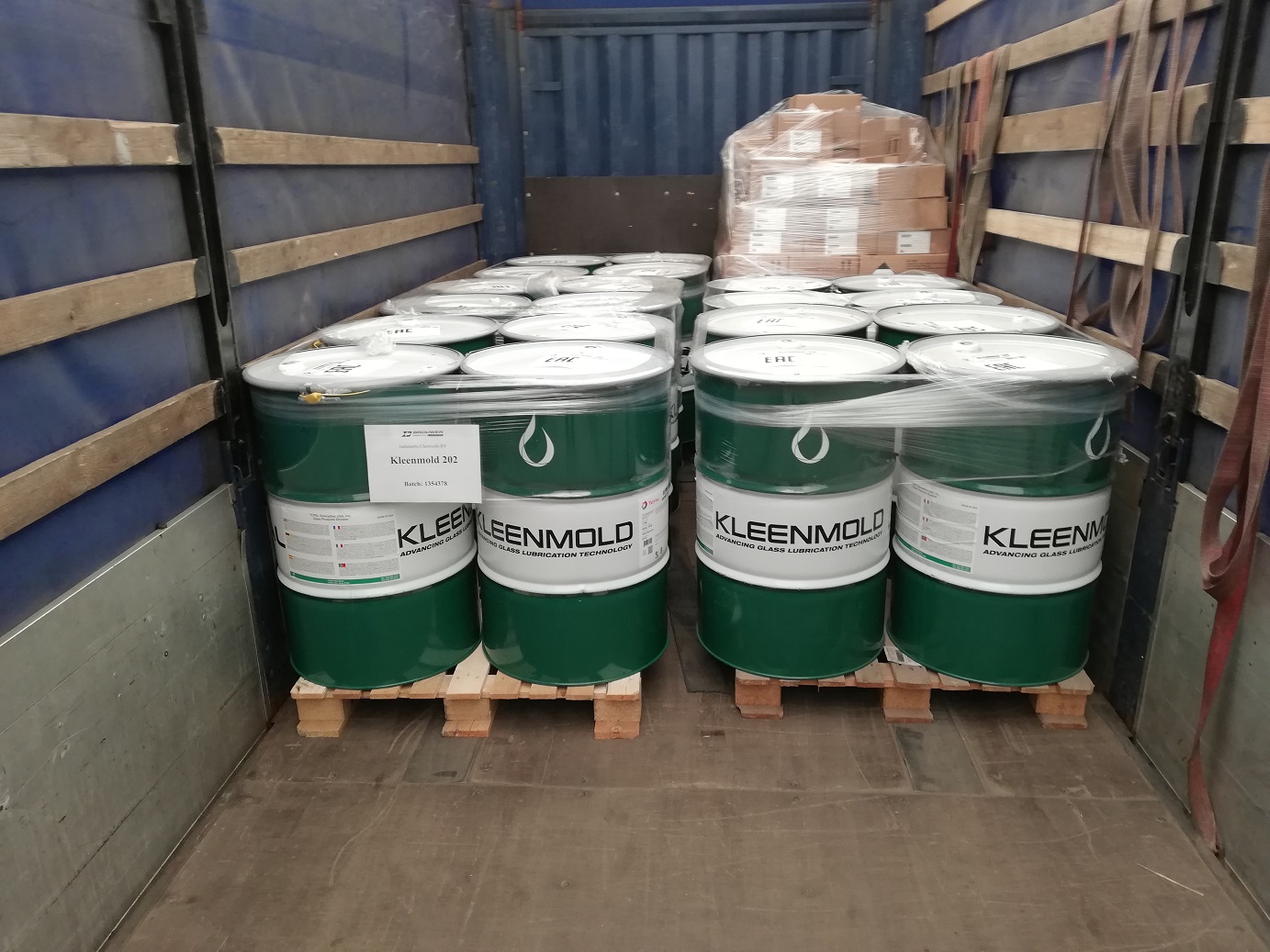Kleenmold Precoat 100
| Part A | Part B | |
| Appearance | Clear liquid | Black liquid |
| Odor | Chemical | Ammonium hydroxide |
| Density [25°C] [77°F] | 8.3 | 9.5 |
| Flash Point | None | None |
| Net Weight [grams] | 110 grams | 140 grams |
| Storage life | 12 months in a sealed container at room temperature | 12 months in a sealed container at room temperature |
- Description
- Advantages
- Recommendations for use
Kleenmold Precoat 100 is a water-based, semi-permanent, non-toxic, nonhazardous coating used asa glass release agent for blanks, molds, neck rings, bottom plates, and related equipment in the glass container industry.
It is supplied as a 2 component product. Part A contains surfactants and adhesives. Part B contains graphite, wetting agents and film formers. The 2 partsare mixed together before application and then spray applied with a Binks or equivalent type spray gun.
Kleenmold Precoat 100 deposits a smooth, uniform, tightly bonded film of graphite onto mold equipment surfaces. Application info on reverse side.
It is supplied as a 2 component product. Part A contains surfactants and adhesives. Part B contains graphite, wetting agents and film formers. The 2 partsare mixed together before application and then spray applied with a Binks or equivalent type spray gun.
Kleenmold Precoat 100 deposits a smooth, uniform, tightly bonded film of graphite onto mold equipment surfaces. Application info on reverse side.
WATER-BASED, NON-TOXIC, NON-HAZARDOUS
APPLY AT ROOM TEMPERATURE
START-UP / JOB CHANGES: WITHOUT SWABBING
SMOOTH UNIFORM COATING
PRODUCES SHINY WARE
APPLY AT ROOM TEMPERATURE
START-UP / JOB CHANGES: WITHOUT SWABBING
SMOOTH UNIFORM COATING
PRODUCES SHINY WARE
SURFACE PREPARATION
Clean and degrease the surface
Oil, rust, grease, loose particlesor other materials should be thoroughly removed from all surfaces to be coated. It is recommended that the surface be degreased and sandblasted prior to application. Avoid finger marks and further contamination of cleaned surfaces before coating.
MIXINGPART
Ashould be added to PART Band thoroughly mixed.
The containerin which Part B is supplied will hold all the contents of Part A.After adding Part A to Part B, the blend should be mixed until a smooth, uniform liquid. The product must be agitated with a stirrer rather than shaken because shaking will create problems during application [foam and bubbles].
APPLICATION PROCEDURE
Hold spray gun 9 to 12inches [23 to 30 cm] from the surface
Spray both seams, then the centerof the blank cavity
Apply a thin, even coating
Allow to dry for several minutes
Reapply
The spray gun should be connected to an air line fitted with a pressure regulator gauge. This allows the air pressure to be adjusted to the correct level to achieve a uniform thin layer. The product should be sprayed from top to bottom. Spray both seams of the blank mold first, then spray the center of the blank cavity. The equipment should be allowed to dry between layers. Apply a thin, even coat and allow to dry for a few minutes. Apply two more thin, even coats in the same manner. We recommend a coating thickness of between 1 and 2 mils (.001” to .002”) be used. To make sure the coating thickness isaccurate, a Biddle Thickness Gauge for measuring non-magneticcoatings over ferrous base substrate can be used.
CURING
Air cure overnight
20 minute cure in 200°C [392°F] oven
For blanks and rings the drying time should be about 10 minutes depending on the ambient temperature and humidity. Curing in an electric oven isrecommended. If a gas fire unit is used, make sure flames do not touch the coated surface. Wipe the cavity lightly with a soft cloth or swab to remove fuzzy appearance or loose graphite particles. The coated mold surface should have a semi-gloss or satin finish. Coated and cured mold equipment can be either installed on the machine or stored for future use.
Clean and degrease the surface
Oil, rust, grease, loose particlesor other materials should be thoroughly removed from all surfaces to be coated. It is recommended that the surface be degreased and sandblasted prior to application. Avoid finger marks and further contamination of cleaned surfaces before coating.
MIXINGPART
Ashould be added to PART Band thoroughly mixed.
The containerin which Part B is supplied will hold all the contents of Part A.After adding Part A to Part B, the blend should be mixed until a smooth, uniform liquid. The product must be agitated with a stirrer rather than shaken because shaking will create problems during application [foam and bubbles].
APPLICATION PROCEDURE
Hold spray gun 9 to 12inches [23 to 30 cm] from the surface
Spray both seams, then the centerof the blank cavity
Apply a thin, even coating
Allow to dry for several minutes
Reapply
The spray gun should be connected to an air line fitted with a pressure regulator gauge. This allows the air pressure to be adjusted to the correct level to achieve a uniform thin layer. The product should be sprayed from top to bottom. Spray both seams of the blank mold first, then spray the center of the blank cavity. The equipment should be allowed to dry between layers. Apply a thin, even coat and allow to dry for a few minutes. Apply two more thin, even coats in the same manner. We recommend a coating thickness of between 1 and 2 mils (.001” to .002”) be used. To make sure the coating thickness isaccurate, a Biddle Thickness Gauge for measuring non-magneticcoatings over ferrous base substrate can be used.
CURING
Air cure overnight
20 minute cure in 200°C [392°F] oven
For blanks and rings the drying time should be about 10 minutes depending on the ambient temperature and humidity. Curing in an electric oven isrecommended. If a gas fire unit is used, make sure flames do not touch the coated surface. Wipe the cavity lightly with a soft cloth or swab to remove fuzzy appearance or loose graphite particles. The coated mold surface should have a semi-gloss or satin finish. Coated and cured mold equipment can be either installed on the machine or stored for future use.



